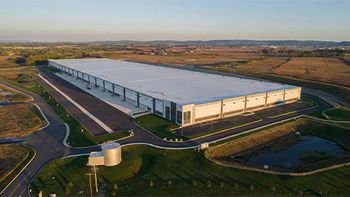
- Pharmaceutical Commerce - January/February 2009
3PLs Rise in Forward-Thinking Supply Chain Models
Moving boxes is becoming just one of a growing slate of services from third-party logistics (3PL) providers
The “L” in 3PL is quickly making the acronym a misnomer. From warehousing and transportation management, to accounting, risk mitigation, and fielding adverse-event reports, ascribing the range of services now delivered by these nimble industry partners to a business labeled “logistics” is becoming less accurate. For drugmakers big and small, 3PLs are becoming a means of staying focused on core drug development and manufacturing competencies—for many their best hope as a fast-changing business struggles through tough economic times.
CREDIT: UPS
To be sure, logistics remains the core of 3PL service offerings, and the function that drugmakers continue to outsource with some eagerness. Just ask Merck, which in January brought logistics outsourcing to new heights when it struck a deal with UPS Healthcare Logistics for the 3PL to take over two of Merck’s distribution centers, near Atlanta and in Reno, NV. The majority of Merck’s U.S. vaccine and pharmaceutical volume flow through these two cGMP-compliant centers, which together add more than 200,000 square feet of healthcare logistics space to the UPS network.
“The idea was to get Merck from where it was in fixed assets into a more variable scenario,” says Bill Hook, UPS VP for healthcare logistics global strategy. “We allow them to grow or shrink in those buildings so they’re not having all those assets tied up.”
To Hook, the Merck deal illustrates the need among companies in traditional pharmaceutical markets to become nimble, a quality less valued in the blockbuster drug business model than in the scrappier, highly competitive environment of today. “Going forward, there are so many challenges to how drugmakers serve their customer base. Big changes are coming in the next few years.”
Big pharma change driver
Merck was the change driver, according to Hook. “It came from a senior executive who wanted to totally change the way they were managing their global supply chain,” he says. “Merck wanted to select a few key global logistics companies to work with to radically improve supply chain processes, rather than look for efficiencies and incremental improvement. He wanted to reinvent the game for supply chain activities.” Merck ultimately picked two global companies to work with, says Hook, and reduced the number of its logistics service providers around the world.
The Merck vision drove change at UPS. “We had to organize around healthcare as a company, rather than around products,” says Hook. “We changed our structure in how we’re going to face Merck and how to map out their supply chain.” UPS hired very knowledgeable people to develop unique service capabilities for healthcare. Among these were transportation services for temperature-sensitive products and “last mile” home delivery. Hook’s team then developed a business case for investment in information technology (in part to aid in regulatory compliance) and physical infrastructure. It then sold the business case internally.
“It was a big, big change on all fronts to support the strategy,” says Hook. Changes justified in the business case involved new IT functionality and new emerging technology processes in addition to the upkeep of existing healthcare platforms. “It’s not just a case of meeting requirements, but also investing in emerging technologies.” The 3PL even integrated technology from its package network to enhance logistics visibility and speed.
Merck’s urgency around the change is evident in the speed of implementation. UPS began operating the facilities nearly in conjunction with the January announcement. By the middle of the month, UPS had offered a job to every Merck person employed at the facilities. Most of them accepted, says Hook. And UPS began work in the facilities to accommodate the needs of other drug- and non-drug-company clients that will be serviced from those locations. “They will very quickly become multi-client facilities,” says Hook.
Forward-thinking models
Like UPS, Cardinal Health is responding to an increased openness among drugmakers to discuss forward-thinking supply chain models that are tailored to them. “That’s really our focus going forward,” says Rob Brown, sales VP for Cardinal Health’s manufacturer services business. “We’re more focused than ever on recommending innovative approaches to inventory positioning, product security, and creating transportation efficiencies. Customers are also more open to learning about the benefits of both dedicated and hybrid operational models.”
The Big Three drug wholesaler’s 3PL arm focuses on specialty pharmaceutical services. It continues to grow its client base and expand operations, according to Brown. The company recently added space to its operation in LaVergne, TN, and last fall opened an 88,000-square-foot facility in Reno. “We are focusing on what’s important to specialty manufactures and their customers: accurate inventory, product integrity, on-time and accurate orders, and flawless back-office execution,” Brown says. “We put tremendous effort into building relationships with our manufacturer customers. We build partnerships, and are focused on understanding partner needs to deliver additional value.”
To illustrate, Brown describes Cardinal’s efforts to improve the metrics that are important to clients’ downstream customers—e.g., order processing and receipt time, order accuracy, and chargeback processing times—which augment the tried and true metrics important to the manufacturers themselves: inventory accuracy, receiving dock-to-stock times and the like.
Leveraging wholesaler resources
“By listening to the needs of our upstream and downstream customers, we’re able to improve supply chain efficiency and deliver value to our customers,” says Brown. Cardinal has also leveraged the capabilities of its wholesaler parent to expand specialty pharmaceutical services in international transportation: customs clearance, freight forwarding, and export services. Additional offerings align specialty pharmaceutical business services with Cardinal Health’s specialty distribution, reimbursement, patient access, and marketing services.
Leveraging the capabilities of a parent company that happens to be a Big Three drug wholesaler has also occurred to 3PL ICS, part of the AmerisourceBergen Specialty Group. ICS offers a portfolio of outsourced services, says Doug Cook, VP for client services. His objective is to integrate not just across ICS but also across the portfolio of AmerisourceBergen Specialty Group. “There’s more appetite for that,” he says. “In the past, we may have seen manufacturers using multiple service providers to meet their needs. Now, a lot of manufacturers are looking for us to be a one-stop shop, to make their lives as simple as possible.”
Cook reports that ICS continues bringing on clients at the same pace as the past few years. But he notes that some clients and potential clients traversing the drug approval process may be moving slower compared to years past. “We see the FDA emphasis on risk evaluation and mitigation strategy (REMS), which can take different forms,” Cook says. “We’re having more discussions about the need for clinical types of programs in combination with distribution programs. Registry capabilities are one example, whether to meet an FDA requirement or for a voluntary program. We see those two components—distribution and clinical services—running into each other, and we’re positioned to put those components together.”
The ICS client base consists of small- to medium-sized pharmaceutical and biotech companies. Startups are a core segment for the 3PL, but it boasts large manufacturer clients, too. Programs run the gamut from full order-to-cash services for range of products in a manufacturer’s portfolio to very targeted services for drug-specific situations.
“We’re happy that we continue to find good clients—those who want to see that tight integration across the core processes that they need to accomplish. They want us to act as an extension of them. That’s were we can be most successful,” says Cook.
The vaccine niche
Indianapolis-based Sentry Logistic Solutions also continues to find and sign clients. CEO Jennifer Marcum reports that in spite of the sad state of the economy she has seen activity in the past few months, the result of contracts that have been in process for some time.
Vaccines, with their stringent temperature and humidity requirements, are a staple for Sentry. “We get a variety of requests for solutions that companies aren’t readily finding,” says Marcum. She sees vaccine demand growing as the concept of wellness and disease prevention is taking hold in healthcare. She notes the $900 million allocated in the Federal Recovery Act to prepare for pandemic flu and to support the advanced development of countermeasures for bioterror and nuclear threats.
In classic 3PL form, Sentry specializes in product handling and takes pride in its validated systems and facilities. The company recently passed a stringent insurance audit for high-value APIs. “We exceeded the norms for industry,” says Marcum. Her goal is to maintain Sentry facilities in top form according to both insurance and regulator requirements. She points out that sub-par facilities and systems—antiquated buildings, past-due preventive maintenance, inadequate security systems—can cost companies millions of dollars.
The facilities and equipment are especially important given the sensitivity of vaccines to temperature. “We want to make sure the product is protected all the way to the end user,” says Marcum. With the growth in retail clinics and their role in providing annual flu vaccinations to the public, Marcum says Sentry demonstrates the benefit that a cold-chain provider brings to retail clinics. It all comes down to specialized facilities and equipment, operated by personnel having the protocol expertise to safely store and transport temperature- and humidity-sensitive products. “We can show temperature history and demonstrate that product integrity has been preserved,” she says.
As Sentry demonstrates, warehouse and product distribution services remain key competencies required by drugmakers. Such functions as inbound product receipt, warehouse storage, inventory control, and outbound order processing may not grab headlines but are in many respects the cost of entry to the 3PL business. At RxCrossroads (Louisville, KY), client access to this kind of data is the goal. The company provides clients with tools to manage customer databases and the distribution channel, from warehouse to patient. Most such services are Web-based and provide real-time information.
RxCrossroads handles both frozen and room-temperature products. Its warehouses are temperature mapped and validated, according to the company. Order processing is supported by an ERP/WMS system that is CFR Part 11 compliant. And the company offers a proprietary case management package, RxCrossware NG, for reimbursement, patient assistance, and product support programs.
Temperature and humidity monitoring
The big box movers are also paying attention to temperature and humidity monitoring and reporting. Logistics giant DHL Global Forwarding announced in January the opening of a life sciences center with such capabilities in Carolina, Puerto Rico. “Few industries pose as much of a challenge to shipping and logistics as life sciences and healthcare,” stated Angelos Orfanos, president of the life sciences & healthcare unit in DHL Global Customer Solutions, in an announcement. “Temperature instability can impact the quality of the material, increase the product order-to-delivery cycle time, and create additional process management costs.” DHL handles small and large volumes of vaccines, active pharmaceutical ingredients, and other temperature-sensitive pharmaceutical, biotech, diagnostic, and medical materials.
The new center is part of a DHL initiative targeting the shipping requirements of pharmaceutical, biotech, and medical device manufacturers doing business in Puerto Rico. Despite its parent company’s withdrawal from U.S. small-package express operations at the end of last year, DHL Global Forwarding, Air Express and Exel supply chain operations continue to be active in the U.S. market. The new Puerto Rico life sciences center has 70,000 square feet of warehouse space.
In June 2008, DHL Global Forwarding announced the expansion of its network of air-transportation Envirotainer QEP certified sites for cold chain shipping that provide for temperature-controlled package handling, in-transit visibility to shipments, and controlled environments for cold chain storage. DHL personnel are trained and certified by Envirotainer, the Lagga Malma, Sweden, developer of aircraft containers for cold-chain shipping, for safe and proper handling of its containers at major airports worldwide.
DHL Global Forwarding is primarily a carrier, but the company has surrounded basic shipping and warehousing with forwarding, customs and related services; it also has a joint venture with air transporter Lufthansa called LifeConex (Plantation, FL) for shipment tracking services. Other major air or ground carriers, such as BAX Global (along with subsidiary Schenker Logistics) FedEx (Memphis, TN) and Penske Logistics (Reading, PA) provide competitive services. The ranks of smaller 3PLs such as Priority Solutions (now a subsidiary of Thermo Scientific) MD Logistics (Plainfield, IN), Cavalier Logistics (Dulles, VA), Panther Expedited (Seville, OH), Life Science Logistics (Fort Worth, TX), Catapault (Buffalo, NY), and Kenco Logistics (Chattanooga, TN) add to the mix. European-headquartered logistics companies such as Kuehne + Nagel, Ceva Logistics, Panalpina are building their U.S. operations.
From logistics to business consulting
The forward-looking supply chain models now being created by big pharma and big logistics have a counterpart in smaller logistics providers that develop very specific service offerings—many of them way beyond the definition of logistics—for smaller and startup companies. “UPS can move a lot of boxes,” says Ross Bjella, president at Menomonee Falls, WI-based DDN. “For us, it’s more about providing a full suite of services—those that require specialized knowledge of the pharmaceutical industry.”
Bjella notes that in the past drug companies would look for cost reductions through the shared-service model. “Now,” he says, “the question is less about how can you save me money, but rather how can you provide me business flexibility and options? DDN aligns its interests with those of its manufacturer clients. We’re not worried about pushing boxes. Nor are we a division of a wholesaler,” he says.
The DDN niche is services for emerging life sciences companies. “Their challenges are significant,” says Bjella, “between cash flow problems and new-market entry problems. Sometimes they don’t weather well. So we have to accommodate for those fluctuations in business activity.”
DDN’s service offerings might best be understood by envisioning a biotech business consultancy turned service provider, rather than a more traditional logistics company that has evolved by adding business services to a core logistics offering. Emerging companies, striving to be virtual companies, often employ a scientific expert, a sales and marketing expert, and executive management, says Bjella. “They rely on us for the majority of the rest of their business functions. Those people are high touch—they need a lot of information. They tend to buy the full suite of services.”
Efficiency and proficiency
Sales and marketing VP Michael Bartholomew adds, “We’re somewhat of a didactic company—we provide efficiency and proficiency, helping smaller companies make better decisions in the marketplace regarding which products to launch.”
The new wave of clients are research driven, he adds, citing Memphis Bioworks, a collection of public, private, academic, and government entities joined by a nonprofit foundation to create a center for the development and commercialization of bioscience technology. “These companies are loaded with R&D and product development people,” says Bartholomew. “But they don’t have true business leadership experience. If they were to stay on their own, what would they do next? They ask us to help them make these decisions.”
DDN can provide the services of accountants and lawyers, for example. Of course, Bartholomew says, some of its services are commoditized and the company does in fact move boxes. “But those are not the things that five years from now will differentiate us,” he adds.
In February, DDN launched a medical affairs subsidiary business with the goal of providing “accurate, timely, and audience-appropriate communication services in the areas of medical information and regulatory affairs,” according to a company announcement. The subsidiary will help life sciences businesses with post-launch support. It will also provide regulatory insights in preparing and submitting adverse event reports, labeling management, product complaints, and medical and technical product inquiries.
“In these economically challenging times, the life science industry is recognizing the need to access services that allow for infrastructure streamlining, while still maintaining rigorous quality standards and the highest level of customer service,” said Carole DeRoche, president of the new division, in an announcement. PC
Articles in this issue
over 16 years ago
Closing The Circle On Patient Adherencealmost 17 years ago
A Pitched Battle in Cardiovascular Drug Marketingalmost 17 years ago
Wyeth Loses Supreme Court Case Over 'Implied' Pre-Emptionalmost 17 years ago
Syringe Design Gets a Makeoveralmost 17 years ago
Refinements in Cold Chain Secondary Packagingalmost 17 years ago
Inmar Rebrands Reverse-Logistics and Related Business Unitsalmost 17 years ago
The Packaging Contribution to Patient Adherencealmost 17 years ago
Moving the Dial on Patient Adherencealmost 17 years ago
FDA to Require REMS of Opioid-Based DrugsNewsletter
Stay ahead in the life sciences industry with Pharmaceutical Commerce, the latest news, trends, and strategies in drug distribution, commercialization, and market access.




